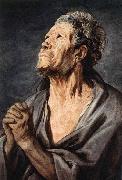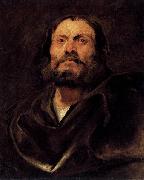Wholesale Oil Painting Reproductions No Minimum and Door to Door! |
|||||||||||
|
|
|||||||||||

|
|||||||||||
|
|
|
||||||||
All JORDAENS, Jacob Oil Paintings |
||||||||
|
|
||||||||
|
|
||||||||
|
Artist Introduction: Flemish painter (b. 1593, Antwerpen, d. 1678, Antwerpen).
Flemish painter, tapestry designer and draughtsman. In the context of 17th-century Flemish art, he emerges as a somewhat complicated figure. His oeuvre, the fruit of a continual artistic development, is characterized by great stylistic versatility, to which the length of his career contributed. His religious, mythological and historical representations evolved from the rhetorical prolixity of the Baroque into a vernacular, sometimes almost caricatural, formal idiom. The lack of idealistic treatment in his work is undoubtedly the factor that most removed Jordaens's art from that of his great Flemish contemporaries Rubens and van Dyck. Jordaens's officially commissioned works included many paintings in which the sublimity of the subject-matter clashed with the vulgarity of some of his figures. Unlike Rubens and van Dyck, both of whom were knighted in the course of their careers, Jordaens was, in fact, completely ignored by the courts of Spain and Brussels |
||||||||
|
|
||||||||
|
An Apostle Painting ID:: 63968 |
1623-25 OIl on oak, 68,5 x 51,5 cm National Gallery, Prague Jordaens painted a series of apostles between 1623 and 1625. The model of these characteristic heads was Abraham Grapheus, the messenger of the St Luke Guild in Antwerp. , Artist: JORDAENS, Jacob , An Apostle , 1651-1700 , Flemish , painting , religious |
|||||||
Height Width |
INS/CM Quality |
|||||||
|
X |
| |||||||
|
|
||||||||
All Anthony Van Dyck Oil Paintings |
||||||||
|
|
||||||||
|
|
||||||||
|
Artist Introduction: Dutch
1599-1641
Anthony Van Dyck Locations
Flemish painter and draughtsman, active also in Italy and England. He was the leading Flemish painter after Rubens in the first half of the 17th century and in the 18th century was often considered no less than his match. A number of van Dyck studies in oil of characterful heads were included in Rubens estate inventory in 1640, where they were distinguished neither in quality nor in purpose from those stocked by the older master. Although frustrated as a designer of tapestry and, with an almost solitary exception, as a deviser of palatial decoration, van Dyck succeeded brilliantly as an etcher. He was also skilled at organizing reproductive engravers in Antwerp to publish his works, in particular The Iconography (c. 1632-44), comprising scores of contemporary etched and engraved portraits, eventually numbering 100, by which election he revived the Renaissance tradition of promoting images of uomini illustri. His fame as a portrait painter in the cities of the southern Netherlands, as well as in London, Genoa, Rome and Palermo, has never been outshone; and from at least the early 18th century his full-length portraits were especially prized in Genoese, British and Flemish houses, where they were appreciated as much for their own sake as for the identities and families of the sitters. |
||||||||
|
|
||||||||
|
|
An Apostle Painting ID:: 88328 |
1618(1618)
Medium Oil on oak
cyf |
||||||
Height Width |
INS/CM Quality |
|||||||
|
X |
| |||||||
|
|
||||||||
|
Prev Next
|
||||||||
|
|
||||||||
|
Related Paintings to Anthony Van Dyck :. |
||||||||
|
|
||||||||
|
CONTACT US |


